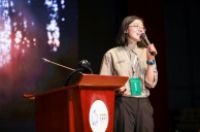
编者按
在2011年的冬季刊,中国发展简报刊发文章,对全球知名社会创新和社会变革的引领和推动者,美国NGO—Ashoka(爱创家)进行了介绍。本期,中国发展简报又荣幸地约请到Ashoka的创始人和CEO比尔·德雷顿( Bill Drayton)先生本人接受专访,分享他个人对社会创新、社会创新家的理解,以及Ashoka在全球各国的实践,包括“登陆”中国的计划和进展。在德雷顿看来,发乎内心、秉持道德操守、专注地奉献于所有人的福祉,以高度的创造性推动社会体系和模式的改变,是社会创新家所需具备的特质。
比尔·德雷顿是阿育王:服务公众的爱创家机构的创始人和首席执行官,他引领了社会创新领域的发展,迄今已经发展了包括近3000名顶尖社会创新家的全球网络,他们共同努力创建一个“人人都是变革者”(everyone a changemaker™)的世界。德雷顿从青少年时期就是一个社会创新家。在哈佛大学和耶鲁大学读书期间,他发起成立了几个组织机构,包括耶鲁大学法律服务中心和每周一次跨学科的社会科学论坛——哈佛大学阿育王会议。1970年,他开始为在纽约的麦肯锡咨询公司工作。1977年到1981年,他担任美国环境保护署助理署长,在任期间,他发起了排放交易(《京都议定书》的基础)和其他改革。1981年,在为麦肯锡咨询公司兼职工作期间,他成立了两家机构,一个是阿育王,一个是保护环境保护署(Save EPA),后者后来更名为环境安全(Environmental Safety)。1984年他被选为麦克阿瑟研究员Fellow,获得奖金,使他得以全身心地投入阿育王的工作。目前他除了担任阿育王理事长兼首席执行官,还担任另外三个项目机构的理事长,分别是鼓励、资助和支持青少年创业的Youth Venture、倡导城市居民创建和共享绿地的Community Greens、推动美国更全面就业政策的Get America Working!。 迄今为止,由于他做出的显赫成就,德雷顿获得了世界上众多的奖项和荣誉。
拍摄:Yusuke Abe
问:你如何定义社会企业(social enterprise, social business)、社会企业家精神(social entrepreneurship)?社会创新家(social entrepreneur)需要具备什么标准,或者具备什么基本素质才能成功?社会创新家和传统的非政府组织在应对和解决社会问题方面有什么不同?
答:围绕注重社会效益的投资,现在正在经历又一轮“社会企业”的发展高潮,社会企业的理念也属于注重社会影响的投资,不同年代有过不同的名称。是啊,谁不喜欢既能带来利润,又能获得有益的社会影响的投资呢?而且,确实有这样的机会,也就相应地有令人心动的故事。
每隔4~6年,人们就会重新发现和捡起这个机会,发现者会骄傲的将之宣扬一番,再给它一个诱人的名称,公司和基金纷纷涌入,资金也投入进来。
其中一些投资基金找到好的交易。不过,由于好机会的数量并没有突然增加,新一轮投资者的资金大多数表现欠佳,或者未能投进去(这属于聪明的少数)。接下来,热情开始悄悄地减退,直到另一个人又重新发现这个传说中的金矿,赋予它新的名称,又一轮投资热潮开启,周而复始。
这些投资潮只集中在注重社会效益投资的一个窄角。其实,可供投资(以及供人们投入时间、信息输入输出、形成独家垄断型业务)的各式各样机会,并不只限于赠款(没有财务回报),还有多重收入的情况(比如一所学校既收取一些费用,又寻求获得赠款,还得到学生家长的许多志愿支持),以及业务投资多元化。
在此之外,这种投资热潮对改变深层的模式没有什么作用。他们宣布有了一种新的“投资类别”,鼓励每个人自己去寻找交易。这其实是散户投资。
社会企业家精神与此有着很深的区别。
社会创新家关注的是模式的改变,而非单个的交易。它不限于某个狭小的金融财务特色领域。
Ashoka对投资一所学校或一家诊所不感兴趣。Ashoka的社会创新家所关注的是教育或育儿的新方式,发现和取缔伪劣药物的新体制,把老年人和年轻人连接起来让他们共同受益的新体系等等。Ashoka伙伴中3/4的人在发起他们行动的5年内,在全国范围内改变了他们所从事的(环境、农村发展等)领域的模式。
在一些情况下,授人以“鱼”很重要。但授人以“渔”一般更好。不过,能起到最大效果的不是这种直接服务,它属于零散服务,而是重新设计整个“捕鱼行业”。
创业者就是这么做的。社会创新家重新设计“捕鱼行业”,为所有人的福祉服务。
问:社会创新家是在什么背景下诞生的,他们能产生什么样的社会影响?他们与非政府组织或公民社会是什么关系?
答:我们所处时代正在以几何级数的速度改变,这也是这一时代发展的基本核心动力。同样呈几何级数增加的还有推动改变的人数,也许还有最为重要的一点,推动改变的人形成越来越多样的组合,以及这种组合之上的组合。
在这个世界上,我们仍旧倾向于认为社会的基本体系是既定的,但是实际上改变正在加速,其中每个和每次改变,又引发社会体系中其他部分的进一步改变。
不过,这些改变很容易走向有害的方向。举例来说,个人隐私现在受到很大破坏。因此,我们需要预防性的监视监测,因为很少数的几个人就会带来巨大的伤害;现在把我们每个人生活中各种事情联系起来予以解密的成本几乎可以忽略不计了;现在占主导地位的数字化业务模式是,你给别人一点什么,就能获得对方的信息,然后销售这些信息就能赚钱(比如通过广告)。结果,导致个人隐私不断迅速外泄,这值得我们警醒,因为许多方面的原因,不仅仅是因为创造性的努力需要隐私保护。
谁会发现这样的陷阱(和新的机会),关心这件事,并且能够帮着引导社会重新回到更好的平衡状态?系统的改变要求有创业者;确实,这也是这类人最突出的特点。这种情况下,我们需要更特殊的一种创业者:社会创新家,他们的人生,并且由此他们的工作,发自他们的内心,专注地奉献于所有人的福祉。大家可以想想他们中的杰出代表,比如当年美国废奴运动的发起者们;南丁格尔,她引导创立了护士这种职业;还有尤努斯,他把小额贷款的模式带到全世界。
就像这些例子所表明的那样,哪里机会最大或者需要最迫切,社会创新家就会出现在哪里。他们不会让针对过时的解决方案设立的条条框框或组织机构边界挡住他们前进的道路。
不过,随着近几十年来社会总体的改变呈几何级数加速(数学上可以证明),我们这一领域也随之在每一方面如此快速发展。30年前,我们不得不创造了“社会创新家”这个词。现在,几乎在所有顶尖商学院里,加入我们这个领域的学生超过了加入以前最受欢迎的市场营销和金融财务领域的。随着这些社会创新家投身实践,公民部门的效率、规模以及近些年来公民部门的全球化经历了爆炸式的增长,远比一个国家的其他经济部门要快得多,至少在我们掌握可靠数据的发达的经济合作组织国家是这样的。这就是为什么这些国家的社会部门的工作机会增长速度是其他经济领域的2.5~3倍。
问:请你介绍一下对世界各地社会创新家的支持。在选择创新家的时候,你们有什么标准和条件?
答:Ashoka要选择一个想法和想法的持有者——那位创新家(以及支持这两者所需的机构),我们必须首先相信这个想法和创新家个人结合在一起会改变一个重要领域的模式(比如健康、环境、儿童和青少年),至少在一个洲的层面。我们会问:这是一个重要的新想法吗?这个人是否有很高的创造性,很有创业者的气质,并且有着极高的伦理道德标准?这个想法经过验证展示后,这个领域的其他人会不会觉得它新颖、重要、切合实际,因此想纷纷效仿?
我们不折不扣地奉行这些标准,选择Ashoka伙伴一共有5个步骤,每个步骤由不同的人进行。Ashoka伙伴中一半以上的人在开展他们活动的5年内改变了全国的政策,启动后5年内在国家层面改变了他们所在领域模式的则达到3/4。在我们工作的80多个国家都是如此,因此我们的选择过程是有效的。
如果大家看一下Ashoka伙伴的工作,一方面大家会看到,一个想法到了创新家的手上,确实可以在那么大程度上改变世界,大家对此会感到欣喜。另一方面,大家也会看到这些想法其实不是高深的科学,这一点会让大家感到惊奇。各位读者,如果您也解放自己,允许自己这样去做,您也能够发现一个问题(这当然不难),并找到一个解决方案,然后使它成为新的模式。我希望各位读者会这样去做!
问:哪种类型的非政府组织适合采取商业模式(如同社会企业那样既注重公众利益,又有商业模式)?这种方式适合做倡导的机构吗,比如环保非政府组织?
社会创新家不限于任何形式,当然更不会限于“社会企业”这样狭窄的一个范围。他们的创造性很大程度上在于找到新的务实地推进大众福祉的方式。
答:社会创新家要做的是创造某样新的东西,为所有人带来福祉,并且行之有效。
在这个问题上,最大的价值来自它超越了别人的想象。情愿谦虚地接受惊喜,甚至享受肯定会遇到的不可预见之事,这对于任何想看到这株奇葩在森林中绽放的人来说,都可以作为智慧的指导。
虽然新事物总是有些让人不自在,但是出于深层次的、可信赖的原因,真正的社会创新家是我们细心、安全的好邻居。社会创新家会一直努力,直至他的贡献成为社会中的新模式。争议和矛盾冲突使他一生的目标面临能否实现的风险。他们不想做出声明,而是必须奉献一生。他们不是活动家或者有政治目的;他们是开拓者,是创新家。
问:Ashoka一直在全球多个国家推广社会创新。过去几年中,社会企业家精神和社会创新已经成为中国非营利部门的一个热点话题和追求。是什么使Ashoka还没有在中国进行更多的参与和推广?是时机的问题吗?你们有什么计划?
答: Ashoka过去几年已经开始在东亚的工作。我们12月份选择了首批两名日本的Ashoka伙伴。他们中的一个正致力于改变老年人护理业,包括把这个领域的一半工作机会给予那些遭受歧视的人,比如移民。另一个伙伴正在许多国家,包括中国, 与听障人士一道开发一种通用的手语。
今年1月28日,我们在日本东北部受到三重灾害打击的地区,启动了一个12~20岁怀揣梦想的青少年参与的特殊项目,帮他们建立团队,向着更好的可持续的方向改变。80个当地的青少年参与进来一起工作。举一个例子,一个14岁女孩的家人因灾去世,住在难民临时住所里,她注意到住在那里的人许多都是孤立隔绝的。因此她清理并建立了一个可供大家见面集会的简单场所,并提供相当于1.2元人民币一杯的咖啡。她计划创建更多这样的场所。
在日本南部的Ashoka青年创业项目中有一个我很喜欢的例子。一位17岁的蒙古交流学生为其他非日本籍的人提供帮助,让他们帮助中国来的游客,这些人在那里找工作不容易。你对她在人生中会成为了不起的贡献者会有些许的怀疑吗?或者,你是否还会怀疑,她帮助所有与她一起工作的其他年轻人理解“移情心理”和团队合作,并且接受一个想法,就是他们自己也可以成为推动改变的人?
我们希望不久可以在中国和韩国更全面地开展工作。针对这两个国家,我们正在寻找高水准的人选,可以带领我们以智慧和敏感的方式提供服务。我们需要的这个人,他/她自己就是一个经过磨练验证的创业者,能在直觉上理解Ashoka的愿景,社交和情感方面的智商很高,有出色的伦理道德操守,并且能使用我们全球团队共同的语言——英语,全面地参与工作。
与此同时,我们也采取了一些小的分享步骤。伯恩斯坦的著作《如何改变世界:社会企业家与新思想的威力》已经从英语翻译成了汉语的简体和繁体版,这是一本对我们这个领域极好的经典介绍,我们感到很高兴。我们带来了多位世界各地领先的社会创新家Ashoka伙伴到中国的大学和其他论坛,介绍我们从事的这个领域和Ashoka伙伴的想法。在中国香港,我们有多位Ashoka伙伴,有Ashoka支持网络小组,还有其他一些项目。世界其他地方的几位Ashoka伙伴已经把他们的工作带到中国。
一旦我们选定我们中国区的代表,我们就会往前推进,一方面是饱含尊重的学习,一方面是往前推进的愿望,我们总是注意这两方面的平衡。到那时,我们一定会有许多问题请教你们。
(宗志国译,付涛审校。感谢宗志国先生在中国发展简报采访过程中提供的支持和帮助。希望反馈意见的的读者,请发邮件至office@cdb.org.cn。)
附英文原文:
How would you define social enterprise (also known as social business) as compared to social entrepreneurship? What standards or essential components should social entrepreneurs have in order to be successful? In addressing social issues, how are social entrepreneurs and traditional NGOs different?
The social investing world is in the middle of another outbreak of embracing “social enterprise,” an idea that has also been associated with impact investing and many other names over the years. How could one not like investing where one can make a profit and achieve useful social impact? Moreover, there really are such opportunities – and therefore enticing stories.
Every four to six years this opportunity is discovered anew, given an alluring name, and publicized by its proud discoverer. Firms and funds are launched, and money is committed.
Some of those investment funds find good deals. However, since the number of good opportunities did not suddenly increase, most of the new wave of investor resources either do poorly or are not invested (the smart minority). The enthusiasm then slinks quietly away – until someone else discovers this El Dorado all over, gives it a new name, etc.
These waves focus on only a narrow sliver of the need for social investing. The full range of opportunity for funding (and people’s time, information in and out, and captive businesses) extends from grants (no financial return) through mixed revenue situations (e.g., a school that earns some fees, seeks grants, and gets a lot of parent volunteering) to diverse business equities. These waves of enthusiasm, moreover, do very, very little to change the underlying patterns. They announce a new “investment class” and encourage everyone to go and find deals. This is about retail investing.
Social entrepreneurship is deeply different.
It is about pattern change, not retail deals. And it is not limited to a narrow financial niche.
Ashoka is not interested in investing in a school or a clinic. Ashoka social entrepreneurs are about, for example, a new approach to educating or parenting, a new system that spots and roots out fake pharmaceuticals or that connects older and young people to their mutual benefit. Three-quarters of the Ashoka Fellows have changed the pattern in their field (e.g., environment or rural development) at the national level within five years of launch. In some circumstances, it is important to give people fish. It is usually better to teach them how to fish. The biggest impact, however, is not such direct service, retail work; it is redesigning the fishing industry.
That is what entrepreneurs do. Social entrepreneurs redesign the fishing industry – to serve the good of all.
What is the background in which social entrepreneurship emerged, and what social impact did/do they have? How does it relate to NGOs or the civil society?
The underlying central force of our era is that the rate of change is still escalating exponentially. So are the number of people causing change and, perhaps most important, the ever-richer combinations and combinations of combinations of people causing change.
In this world, the basic systems of society, which we still tend to think of as being givens, are in fact changing ever more rapidly -- with each change triggering yet further changes in other parts of society’s systems.
These changes can easily go in harmful directions. Thus, for example, right now privacy is suffering terribly. We need preventive surveillance because now a very few can cause huge harm; the cost of connecting all the dots in all our lives has become negligible; and the dominant digital business model is to give people something, get information in return, and make a profit by selling that information (e.g., via advertising). Our consequent accelerating loss of privacy is alarming for many reasons, not least the fact that creativity needs privacy.
Who will spot such traps (and new opportunities), care, and be able to help guide society back to better balance? Systems change requires entrepreneurs; indeed, this is what defines this special type of person. And here one needs the even more special social entrepreneur: The lives -- and therefore the work -- of these men and women are devoted from deep within to the good of all. Consider the founders of the movement that ended slavery; Florence Nightingale, who pioneered the nursing profession; and Muhammad Yunus, who spread microcredit across the globe.
As these examples suggest, social entrepreneurs work wherever the opportunity or need is greatest. They do not let the definitional or organizational boundaries created to serve yesterday’s solutions get in the way.
However, as the underlying rate of change has accelerated exponentially (this is mathematically true) over the last decades, our field has grown every bit as fast. We had to invent the term “social entrepreneur” 30 years ago. Now in virtually all the leading business schools, more students sign up for our field than the old favorites, marketing and finance. As these social entrepreneurs have gone to work, the productivity, scale, and now globalization of the citizen sector have experienced explosive growth -- far much more so than the rest of the economy in the advanced OECD countries where we have reliable statistics. That is why the social sector in these countries is growing jobs at 2.5 to 3 times the rate of the rest of the economy.
Can you describe your support to social entrepreneurs in the world? What criteria and conditions do you impose when choosing them?
For Ashoka to elect an idea and its entrepreneur (and the institution needed to support both), we must believe that the idea and the person together will change the pattern in an important field (for example, health, the environment, children and young people), at least at a continental level. Is there an important new idea? Is the person highly creative, very much an entrepreneur by temperament, and guided by strong ethical fiber? Is the idea, once demonstrated, one others in that field will copy because they find it new and important and practical?
We are very tough in applying these criteria – using a five step selection process with different people at each step. Over half the Ashoka Fellows have changed national policy within five years of their launch. Three quarters have changed the pattern in their field at the national level within the same five years. This is true over the 80 countries where we work. Our process works.
When are looks at the work of the Ashoka Fellows, on the one hand one is delighted and amazed by the degree to which an idea in the hands of an entrepreneur can, indeed, change the world. One is also struck by the fact that the ideas are not rocket science. Any of your readers, if they just gave themselves permission and went at it, could identify a problem (that certainly is not hard!), figure out a solution, and then make it the new pattern. I hope they will!
What types of NGOs are suitable for a business model approach (that is, in the public interest and also using a business model, as in a social enterprise)? Is it appropriate for advocacy organizations, for example, environmental NGOs?
Social entrepreneurs are not limited to any form, certainly not the narrow sliver of “social enterprise.” Much of their creativity lies in finding new, practical ways of advancing the good.
What is the role of the social entrepreneur in society?
The social entrepreneur’s job is to create something new. Something that serves the good of all — and something that works.
The greatest value here comes from something others have never imagined. A humble willingness to be surprised, even to enjoy the predictably unpredictable is a wise guide for all who want this very special orchid in the forest to bloom and flourish.
Although the new is always a little uncomfortable, the true social entrepreneur is carefully and for deep, reliable reasons, a safe neighbor. The social entrepreneur lives for the day his/her contribution has become society’s new pattern. Controversy and conflict put his/her life purpose at risk. They do not want to make a statement. They have to make their life contribution. They are not activists or political; they are entrepreneurs.
Ashoka has been working in many countries to promote social entrepreneurship. In the last few years, social entrepreneurship and social innovation have become hot topics and pursuits in the not-for-profit sector in China. What is holding Ashoka back from becoming more involved and promoting it in China? Is it because of timing? What are your plans?
Ashoka has begun work in East Asia over the last several years. We elected the first two Japanese Fellows last month. (One is transforming care for the elderly — including moving to give half the jobs in the field to those suffering discrimination, including immigrants: The other Fellow is working with the deaf in many countries, including China, to develop one common sign language.)
And on January 28, we launched a special program in the triple disaster-hit northeast for 12- to 20-year-olds with their own dream to help them build their own team and leave an ongoing change for the good. Eighty local young people came and are at work. One example:a 14-year-old girl who lost family and is living in refugee housing noticed that many of the people living there were isolated. She is therefore putting in place a simple meeting place with coffee for the equivalent of 20 U.S. cents. She plans more such centers.
One of my favorite encounters in this Ashoka Youth Venture program in southern Japan was a 17-year-old Mongolian exchange student who is helping other non-Japanese, who have trouble getting jobs there, help tourists from China. Do you have a moment’s doubt that she will be a great contributor in life? Or that she is helping all the other young people working with her learn empathy and teamwork and also absorb the idea that they too can become changemakers?
We hope to begin work more fully in China and Korea soon. In both cases, we are looking for a superb caliber person who can guide us to serve in wise and sensitive ways. We need someone who is himself or herself a proven entrepreneur, who intuitively “gets” the Ashoka vision, who has strong social and emotional intelligence, who has exceptional ethical fiber, and who can be a full member of a global team that uses English as our common language.
In the meantime, we have taken small steps to share. We were delighted when David Bornstein’s How to Change the World: Social Entrepreneurs and the Power of New Ideas (Oxford and 30 other publishers), the excellent classic introduction to our field, was translated into both forms of Chinese. We have brought a series of Ashoka leading social entrepreneur Fellows from around the world to universities and other forums in China to help introduce our field and the Fellows’ ideas. We have a number of Fellows, an Ashoka Support Network group, and other programs in Hong Kong. A number of Fellows from many other parts of the world have brought their work to China.
Once we find our Representative, we will proceed, as we always do, balancing respectful learning and our desire to move ahead. We will certainly come to you with many questions.




